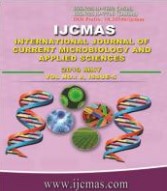


 National Academy of Agricultural Sciences (NAAS)
National Academy of Agricultural Sciences (NAAS)

|
PRINT ISSN : 2319-7692
Online ISSN : 2319-7706 Issues : 12 per year Publisher : Excellent Publishers Email : editorijcmas@gmail.com / submit@ijcmas.com Editor-in-chief: Dr.M.Prakash Index Copernicus ICV 2018: 95.39 NAAS RATING 2020: 5.38 |
The citrus nematode, Tylenchulus semipenetrans is known to occur in all citrus growing regions. The nematode feeds upon cortical cells and results in thicker roots than normal. The nematode caused yellowing of leaves and early fruit drop. A random survey was conducted in major citrus growing regions of Tamil Nadu to isolate the endophytes from the roots of acid lime (Citrus auruntifolium) and test the efficacy against citrus nematode, T.semipenetrans. Eight bacterial and four fungal endophytes were isolated from fifty one samples and an in vitro study was conducted to test the biocontrol efficacy against citrus nematode. The results revealed that four isolates viz., VSEB3, VREB8, PMEB1 and VREF3 significantly reduced the egg hatching (97.17, 96.60, 89.24 and 88.10 percent respectively) and showed highest juvenile mortality (100, 100, 99.33 and 87 percent respectively) at 100% concentration on five days and 72h of exposure respectively.
 |
 |
 |
 |
 |